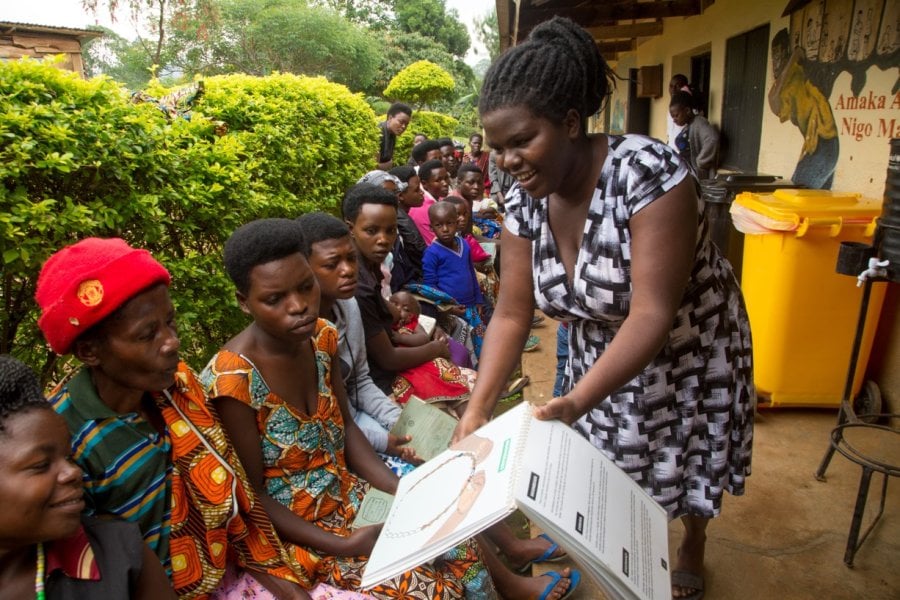In the wake of these important meetings, we spoke to Carina Hirsch, Advocacy & Project Manager at the Margaret Pyke Trust, who also teaches on our MSc Sexual & Reproductive Health Policy and Planning, about the need to include sexual and reproductive health and rights in the climate and biodiversity conversation.

Women sit in a line outside a sexual health clinic in Uganda as another woman shows them information. In Uganda, the Margaret Pyke Trust trains healthcare professionals in sexual and reproductive health. Ethnographic research undertaken locally has demonstrated a deep and widespread understanding of the connections between climate impacts, livelihoods, health and environment among the community members who are calling for better health services. Credit: Margaret Pyke Trust / Mark Baron
Tell us about the Margaret Pyke Trust and what your role involves:
The Margaret Pyke Trust is the only member of the International Union for Conservation of Nature (IUCN) that also has over 50 years of family planning expertise. We are uniquely placed to advocate for and effect change in global and institutional biodiversity and climate policy, promoting the importance for the conservation of nature of removing barriers to family planning, in addition to empowering and improving the health of women and girls. Alongside advocacy, we also design and manage projects integrating family planning and conservation action. As the Advocacy & Projects Manager, I lead the Trust’s engagement in advocacy forums and play a key role in creating cross-sectoral partnerships to build an ever-growing alliance of health and conservation organisations to promote the removal of barriers of rights-based, voluntary family planning as a win-win for women and the environment.
Why are COP meetings important for sexual and reproductive health and rights (SRHR)?
We know that the climate crisis and biodiversity loss affect women and girls in different ways to men and boys. In vulnerable communities, women and girls are often the hardest hit by the effects these threats. Given the broad disruption to health systems and services deriving from increased frequency and intensity of climate events, they can face disruption to sexual and reproductive health services; an increased risk of gender-based violence (GBV); and are forced to leave education early during disasters or displacement due to environmental pressures.
The areas of the world with the highest levels of unmet need for family planning and broader SRHR overlap with areas of the world experiencing the most intense and harrowing effects of climate change. Many of these countries and areas are found in Sub-Saharan Africa. There is a great degree of variation within countries, with remote, rural, “last mile communities” often bearing the effects of climate change and least served by health service providers. Often these are also the areas of the world who have contributed least to the climate crisis.
Alongside climate discussions, COP meetings present an important opportunity to raise awareness of the health needs of these communities, particularly SRHR, and lobby policymakers to create positive change that protects the world’s most vulnerable people. Access to SRHR services, including family planning, is part of what broader, holistic resilience building strategies should look like. We are seeing increased spaces for these topics at COP27 and COP15 with various conversations on issues across the SRHR spectrum including gender-based violence.
Was any progress made to protect SRHR at COP27 or COP15?
Family planning was hailed as a climate adaptation strategy in Intergovernmental Panel on Climate Change’s (IPCC) 5th Assessment Report released in 2014 and there are several references to the impact of the climate crisis on SRHR in the early contributions to the 6th Assessment Report, published in 2022 – this is promising progress.
There was a lot of talk about gender and gender equality at both COP27 and COP15, but there were no specific references to SRHR in the climate or biodiversity agreements that the meetings produced which was disappointing.
However, there are significant references to gender equality, human rights, gender responsive action and the importance of mobilising multiple sectors in the newly adopted Global Biodiversity Framework and related targets that were agreed at COP15. These are very important entry points for work on SRHR allowing for advocates to make the case that fulfilling SRHR, especially reproductive choice, is fundamental to achieving gender equality, human rights and gender responsive action.
What needs to happen next?
We need to continue to claim a place for SRHR in policy making forums in the climate and biodiversity policy spaces and use these opportunities to continue building an alliance of policy makers, donors and implementing organisations. An evidence base is crucial for a multi-sectoral, high-impact approach to global health and development challenges. The work of MARCH members and partners, such as the Margaret Pyke Trust, play a critical role in advocating for and implementing approaches that work to protect women’s and girls’ SRHR to ensure we continue to make progress on gender and health goals as well as contributing to integrated conservation action and climate change response. An integrated approach is essential to achieving the SDGs.
LSHTM is partnering with the Margaret Pyke Trust on the Healthy Wetlands for the Cranes and People of Uganda project in Rukiga, Uganda, to expand the evidence base on how to integrate conservation, sustainable livelihoods and SRHR programmes and MARCH staff and students have been – and are – involved in analysing the data to contribute to the development of a proof of concept. This kind of evidence is critical for informing policy decisions by both national governments and international donors.
If you enjoyed this article and would like to build a career in global health, we offer a range of MSc programmes covering health and data, infectious and tropical diseases, population health, and public health and policy.
Available on campus or online, including flexible study that works around your work and home life, be part of a global community at the UK's no.1 public health university.
